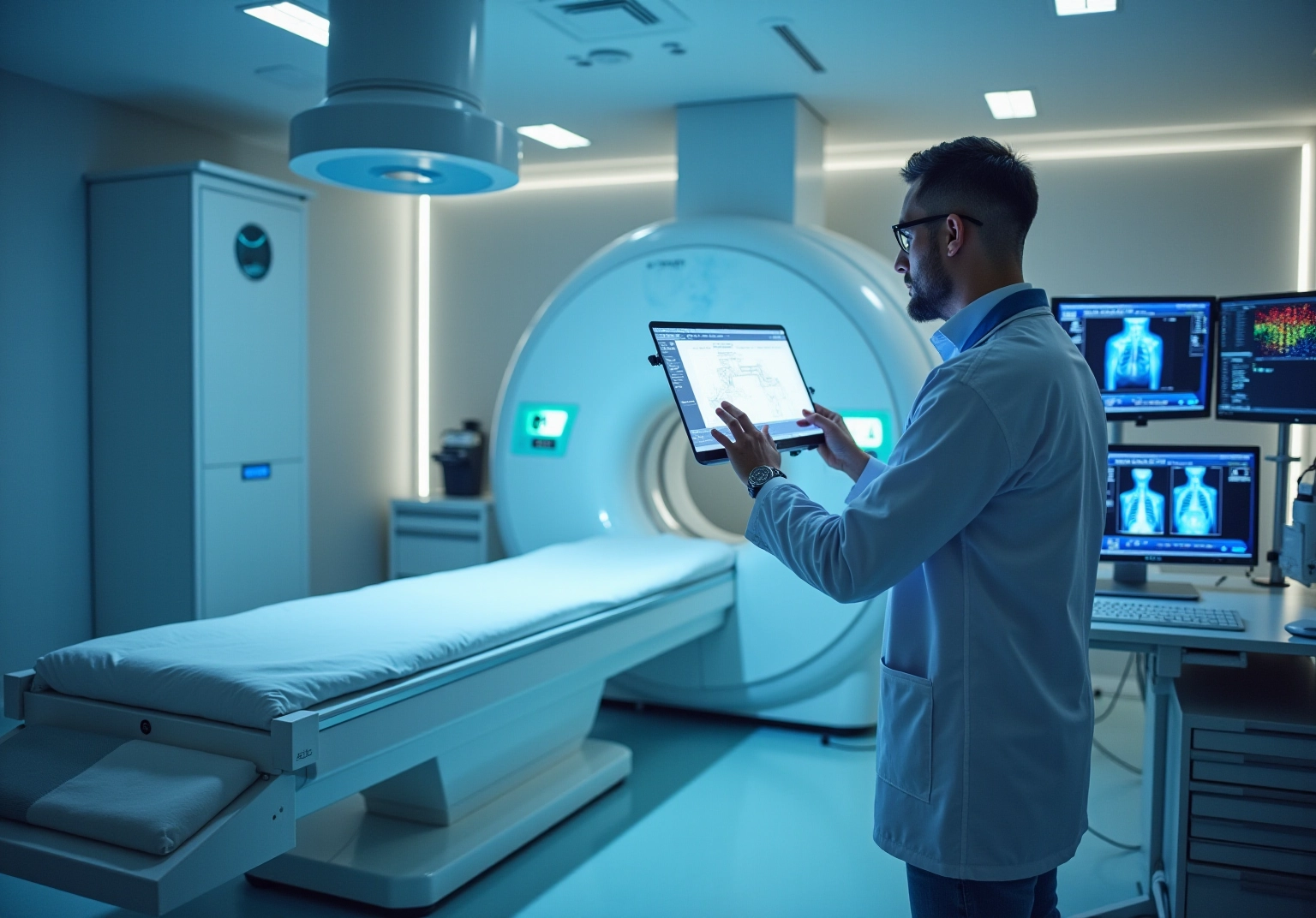
This article explores seven significant benefits of AI in healthcare, primarily emphasizing enhanced efficiency and compliance across various medical processes, such as diagnosis, patient care, and administrative tasks. It underscores how AI technologies not only improve diagnostic accuracy but also streamline coding and billing, and personalize treatment plans. These advancements ultimately lead to improved patient outcomes and substantial operational cost savings for healthcare providers.
In a world where healthcare challenges are ever-evolving, the integration of artificial intelligence (AI) has emerged as a transformative force. This technological revolution not only enhances operational efficiency but also significantly improves patient outcomes and compliance with regulatory standards. As healthcare providers grapple with increasing demands and complexities, the question arises: how can AI truly reshape the landscape of healthcare delivery?
By exploring the multifaceted benefits of AI—ranging from streamlining administrative tasks to personalizing patient care—this article delves into the critical role AI plays in enhancing efficiency and compliance within the healthcare sector.
The Inferscience HCC Assistant leverages advanced AI algorithms to optimize the collection and analysis of clinical data, delivering immediate coding recommendations at the point of treatment. This innovative approach not only simplifies the HCC coding process but also allows service providers to allocate more time to patients while maximizing funding from Medicare Advantage agreements.
By performing a gap analysis on claims files, the HCC Assistant identifies HCC codes that may have been billed by other providers or the individual’s primary care provider in the previous calendar year, ensuring a more accurate representation of individual conditions and anticipated medical costs. Additionally, the integration of sophisticated NLP tools aids in consolidating medical data, reducing the likelihood of coding errors and enhancing compliance.
By alleviating administrative burdens, the HCC Assistant significantly boosts coding accuracy and compliance, positioning itself as an indispensable resource for healthcare organizations. In fact, medical practitioners utilizing AI-driven solutions have reported a reduction in hospital readmissions by approximately 50%, which underscores the benefits of AI in healthcare for operational efficiency and patient outcomes.
As the need for precise coding continues to escalate, tools like the HCC Assistant are critical in navigating the intricacies of medical regulations and ensuring that providers effectively meet compliance standards.

The benefits of AI in healthcare are evident as AI technologies revolutionize medical diagnosis by enabling faster and more accurate assessments. For instance, AI algorithms can analyze medical images, such as X-rays and MRIs, achieving diagnostic accuracy rates of up to 94%, often surpassing human radiologists who typically score around 65%. This capability not only speeds up the diagnostic process but also showcases the benefits of AI in healthcare by improving the overall quality of treatment, resulting in timely interventions and better outcomes for individuals.
Radiologists have noted that AI assists in identifying conditions that may be overlooked, thereby reducing diagnostic errors that affect approximately 5% of the population annually. Moreover, the benefits of AI in healthcare, including its ability to analyze large volumes of information rapidly, enable medical practitioners to concentrate more on individual well-being, ultimately optimizing workflows and improving adherence to regulatory requirements.
Notably, AI can rule out heart attacks twice as fast as humans, achieving an impressive 99.6% accuracy. As AI continues to advance, the benefits of AI in healthcare are expected to further transform evaluations of individuals, making medical services more efficient and effective.
AI-driven tailored healthcare empowers providers to customize treatments through a comprehensive analysis of individual data, including genetic profiles, lifestyle choices, and medical histories. This innovative approach addresses the limitations of traditional healthcare by enabling clinicians to create personalized treatment strategies that significantly improve the chances of successful outcomes. As a result, patient engagement and satisfaction are markedly enhanced. Furthermore, this tailored methodology aligns seamlessly with value-based models that prioritize quality over quantity.
Eliminating manual processes and ensuring accurate documentation are crucial for achieving these improvements. Studies reveal that personalized treatment plans can lead to a remarkable 20-30% increase in treatment efficacy, underscoring the benefits of AI in healthcare and its transformative potential in revolutionizing healthcare delivery. As we move toward 2025, the integration of AI in developing tailored treatment strategies is expected to become standard practice, further solidifying its role in enhancing care for individuals.
The benefits of AI in healthcare are evident as it revolutionizes the drug discovery process by analyzing vast datasets to identify potential drug candidates with unprecedented efficiency. Traditional drug development methods are often time-consuming and costly; however, machine learning algorithms can predict how various compounds will interact with biological systems. This innovation not only accelerates the accessibility of new medications but also showcases the benefits of AI in healthcare by enhancing the accuracy of treatments. Ultimately, these advancements provide individuals with the benefits of AI in healthcare when seeking effective healthcare solutions.
The benefits of AI in healthcare are evident as AI technologies revolutionize the medical field by automating critical administrative tasks such as appointment scheduling, billing, and coding. This shift towards automation is not merely a trend; it is an essential response to an industry grappling with significant staffing shortages and escalating operational demands.
Inferscience’s API solution directly addresses these challenges by enabling seamless HCC coding data exchange and consolidating individual data among providers, payers, and third-party vendors. This ultimately leads to more informed decisions and improved outcomes. By streamlining these processes, medical organizations can leverage the benefits of AI in healthcare to drastically reduce errors and conserve valuable time.
Practices utilizing AI-driven solutions have reported an impressive 91% decrease in document processing time, allowing staff to focus more on client service rather than administrative duties. Furthermore, the integration of AI tools demonstrates the benefits of AI in healthcare, with projections suggesting that these applications could lead to substantial cost savings, potentially cutting annual U.S. medical expenses by $150 billion by 2026.
This automation not only enhances operational efficiency but also demonstrates the benefits of AI in healthcare by empowering medical professionals to dedicate more time to delivering quality care, thereby elevating overall service delivery and client satisfaction. Inferscience’s Claims Assistant further boosts this efficiency by providing real-time HCC coding gap analysis, ensuring billing accuracy and compliance.
AI-driven predictive analytics empower medical organizations to accurately forecast patient demand, optimize staffing levels, and manage inventory with heightened efficiency. By harnessing historical data and pinpointing emerging trends, medical providers can make informed decisions that significantly lower operational costs and elevate service delivery.
Effective healthcare database management systems are integral to this process, enabling seamless information exchanges across departments and professionals, thereby ensuring that all medical conditions are documented with precision. This proactive approach not only streamlines workflows but also ensures that resources are allocated precisely where they are needed, ultimately enhancing care outcomes.
Moreover, improved data management reduces errors in medical record keeping and aids in prescriptions and diagnoses, delivering financial advantages by minimizing expenses and time spent on paperwork and administration. As medical leaders recognize the importance of these technologies, the integration of AI in resource management is poised to revolutionize operational practices, demonstrating the benefits of AI in healthcare by enhancing responsiveness to patients’ needs.

AI is revolutionizing medical imaging, showcasing the benefits of AI in healthcare by significantly enhancing both the accuracy and speed of image analysis. Advanced algorithms are now capable of detecting subtle abnormalities in X-rays, MRIs, and CT scans that may elude human radiologists.
For instance, AI diagnostic tools have achieved an impressive 94% accuracy rate in detecting lung nodules, surpassing the 65% accuracy of human radiologists. This enhanced diagnostic ability highlights the benefits of AI in healthcare by facilitating earlier identification of conditions, thereby improving outcomes for individuals, and also optimizing radiology workflows.
By automating routine tasks, AI empowers radiologists to concentrate on more complex cases, thus enhancing overall efficiency in medical environments. Furthermore, research indicates that the benefits of AI in healthcare, particularly in AI-driven diagnostics, can reduce the time required for image analysis, enabling quicker clinical decision-making and improving patient care.
Notably, 57% of physicians recognize reducing administrative burdens as the most significant opportunity for AI, underscoring its potential to enhance workflow efficiency. However, it is crucial to consider that 57% of US adults believe AI could negatively affect the relationship between patients and medical professionals.
Additionally, the benefits of AI in healthcare include projected savings for the industry of between $200 billion and $360 billion annually, highlighting the financial advantages of AI implementation. A compelling example of AI’s impact on diagnostic accuracy is illustrated in a study where AI-enhanced ECG screening improved first-time detection of ventricular dysfunction by 32% compared to standard care.

AI technologies are revolutionizing Electronic Health Record (EHR) management, highlighting the benefits of AI in healthcare by significantly enhancing information accessibility and streamlining workflows. The automation of data entry not only ensures compliance with medical regulations but also provides healthcare practitioners with real-time access to individual patient information. This facilitates seamless data exchanges across various medical touchpoints. As a result, the benefits of AI in healthcare, particularly advancements in EHR management, enhance clinical decision-making while alleviating the administrative burden on medical personnel, allowing them to dedicate more time to patient care.
Moreover, efficient database management systems elevate the quality of care by minimizing errors in record-keeping and reducing costs associated with paperwork and administration. Studies indicate that AI can decrease the time spent on administrative tasks by approximately 20%, leading to heightened efficiency and job satisfaction among medical professionals. As one medical provider noted, ‘AI has revolutionized our information management practices, facilitating swift access to essential client details.’
Additionally, the integration of Natural Language Processing (NLP) tools is crucial for consolidating individual data, which is vital for accurate risk adjustment. This transition towards AI-driven solutions is imperative for enhancing operational efficiency and leveraging the benefits of AI in healthcare, ensuring that healthcare providers can deliver high-quality care.

AI virtual assistants are revolutionizing user engagement by delivering customized support and information. These advanced tools assist individuals with critical tasks such as:
By significantly enhancing communication and accessibility, AI virtual assistants demonstrate the benefits of AI in healthcare by empowering individuals to take an active role in their healthcare. This proactive engagement leads to improved adherence to treatment plans and, ultimately, better health outcomes.

AI is revolutionizing mental health assistance by enhancing individual monitoring and support through advanced tools. AI-driven applications leverage technologies such as Natural Language Processing (NLP) and machine learning to analyze individual data, identifying trends and potential issues. This capability enables timely interventions that can significantly improve outcomes. For example, AI models have demonstrated an impressive 92% accuracy in predicting suicide attempts, allowing mental health professionals to respond swiftly to individuals at risk.
Moreover, the benefits of AI in healthcare, including AI chatbots, provide prompt assistance and resources, improving access to mental health services for those who might otherwise hesitate to seek help. This integration not only enhances patient outcomes but also plays a crucial role in reducing the stigma associated with mental health support. As emphasized by mental health experts, the benefits of AI in healthcare to bridge gaps in support are substantial, particularly in underserved communities where conventional resources are limited.
Furthermore, the AI sector in mental health is projected to reach USD 11.9 billion by 2034, reflecting the growing recognition of AI’s importance in addressing the shortage of mental health professionals and enhancing service delivery. However, it is vital to consider the ethical concerns surrounding AI, including data privacy and potential biases, as these factors will significantly influence the effective implementation of AI solutions in mental health care.
The integration of artificial intelligence (AI) in healthcare is not merely an advancement; it signifies a substantial transformation in the operational dynamics of healthcare systems, enhancing both efficiency and compliance. By leveraging AI technologies, healthcare providers can streamline administrative tasks, improve diagnostic accuracy, and personalize patient care, ultimately leading to superior health outcomes and optimized resource allocation.
Throughout this article, the myriad benefits of AI in healthcare have been underscored, including its transformative impact on medical diagnosis, drug discovery, and operational efficiency. The application of AI tools, such as the Inferscience HCC Assistant, exemplifies how AI can simplify complex processes like coding and billing, while predictive analytics and virtual assistants enhance patient engagement and support. These advancements not only reduce costs but also empower healthcare professionals to concentrate more on patient care rather than administrative burdens.
As the healthcare landscape continues to evolve, the significance of adopting AI solutions cannot be overstated. Embracing these technologies is crucial for healthcare organizations striving to enhance service delivery, improve compliance with regulations, and ultimately provide superior care for patients. The future of healthcare resides in the effective integration of AI, making it imperative for stakeholders to invest in and prioritize these innovative solutions for a more efficient and responsive healthcare system.